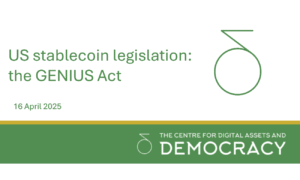
US STABLECOIN LEGISLATION: THE GENIUS ACT
As we in the UK wait for a consultation paper on stablecoins, the US has moved ahead and passed the Guiding and Establishing National Innovation for US Stablecoins Act of 2025, commonly known already as the “GENIUS Act”.
Having received strong support across both the Republican and Democrat parties, it seems likely that the GENIUS act will be approved by Senate. Added to this, Donald Trump has indicated his support. If things go smoothly, it is likely that legislation for payment stablecoins will become law in 2025.
In advance of the FCA’s publication of its consultation paper on stablecoins, we look at what the GENIUS Act proposes.
Definition
Definitions are key and the GENIUS Act defines a payment stablecoin as a digital asset that is or is designed to be used as a means of payment or settlement if:
- the issuer is obligated to convert, redeem, or repurchase for a fixed amount of monetary value;
- it will maintain a stable value relative to the value of a fixed amount of monetary value; and
- it is not a national currency, bank deposit, interest-bearing instrument, or a security under federal securities laws (other than by virtue of being a bond, note, evidence of indebtedness, or investment contract).
Note that this is for a payment stablecoin. This partly explains why the definition is longer than that of asset reference tokens in the EU’s MiCA Regulation.
Regulation
Issuers of stablecoins have to meet two requirements.
The first is jurisdiction as permitted payment stablecoin issuers have to have been incorporated in the US.
The second is regulation by the relevant regulator. A payment stablecoin issuer must be approved by the Office of the Comptroller of the Currency (OCC) in accordance with the terms of the GENIUS Act, unless it is a subsidiary of an approved entity or a has been approved by a state payment stablecoin regulator.
It is interesting to note that neither the SEC or the CFTC will have jurisdiction over payment stablecoins. Payment stablecoins will be excluded from the definitions of “security” and “commodity”. In the UK, stablecoin regulation will be conducted by the FCA.
How the required approval can be granted and what is needed are set out in the GENIUS Act. For example, the applicant must be able to show that its financial condition and resources are sufficient and that the background information it provides on its officers, directors and principal shareholders demonstrate their suitability. These are similar to the requirements which the FCA place on applicants which wish to be regulated or registered (under the current crypto regime) by it and, like the FCA, US regulators are able to refuse applications.
Following the theme of similarities with the FCA and its approach to those firms it regulates and registers, the GENIUS Act requires payment stablecoin issuers to comply with certain standards.
Perhaps the most important of these for risk management is that of reserves. Permitted payment stablecoin issues will have to maintain reserves backing their payment stablecoins on at least a 1:1 basis with acceptable reserves including US coins and currency, deposits with Federal Reserve Banks, demand deposits at insured depository institutions, Treasury bills, notes, or bonds with a maturity of 93 days or less, certain repurchase agreements, reverse repurchase agreements, and money market funds. Here there are some similarities with the reserves required under the EU’s MiCA Regulation and we expect this thinking to be taken into consideration by the FCA.
Non-US restrictions
The GENUIS Act will favour payment stablecoins which are issued by permitted stablecoin issuers. Only these will be able to be treated as cash or a cash equivalent for accounting, securities margin, or derivatives purposes, or used as a settlement asset for wholesale payments between banking organizations or by payment infrastructure for settlement among banking organizations. In addition, non-US a payment stablecoin issuer which is not permitted under the GENIUS Act may be prohibited from facilitating secondary trading of its payment stablecoins in the United States and so be unable to attract US customers.
The US and the UK
The UK is positioned to be able to learn from, and take the best from, the EU’s MiCA Regulation. While the GENIUS Act is not as old as MiCA, the FCA may consider its terms as well.
Importantly, there are two issues which marry the US and the UK, which are not enjoyed by the EU member states.
The first is that the US and the UK are sovereign states. The second is that they both use the common law system, a legal system which is flexible and responsive to the unique characteristics of its own people and businesses.
The UK and the US are well placed to work together and build two leading stablecoin hubs which attract global business.

